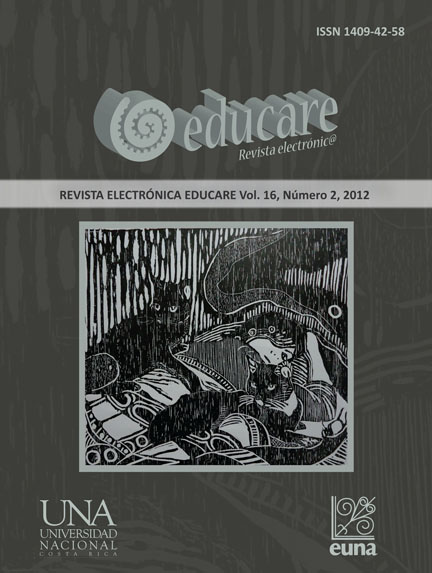Professional Autonomy. Key Competence for Teachers in Commercial Education
DOI:
https://doi.org/10.15359/ree.16-2.10Keywords:
Competencies, teaching autonomy, knowledge, professional autonomy, Commercial Education, administrative management, secretarial profession.Abstract
The way in which the teaching autonomy is materialized, considered as part of the path traveled by the teaching community on their way to become owners of the disciplinary knowledge and the required pedagogical competencies to practice their role has motivated this paper. For success, Commercial Education requires the urgent transformation of the teaching role and the development of key competences to promote interdisciplinary integration, academic and administrative leadership and the use of contemporary pedagogies. The level of awareness reached by the teaching group about the impact of the learning that is promoted within the educational context will allow the empowerment of the knowledge that comes from the relationship between theory and practice-key element for professional autonomy.
References
Araya, I. (2011). Diagnóstico curricular y propuesta de perfil profesional por competencias de la
Licenciatura en Educación Comercial. (Tesis de maestría inédita). Universidad de Costa Rica.
Flórez, R. (1994). Hacia una pedagogía del conocimiento. Bogotá: McGraw-Hill.
Freire, P. (2002). Pedagogía de la autonomía. Argentina: Siglo XXI.
Gardner, H. (2005). Las cinco mentes del futuro. España: Paidós Ibérica
Marchesi, A. (2007). Sobre el bienestar de los docentes: Competencias, emociones y valores. Madrid:
Alianza.
Savater, F. (1997). El valor de educar. Barcelona: Ariel.
Torres, J. (1998). Globalización e interdisciplinariedad: El currículum integrado (3ª ed.). Madrid:
Ediciones Morata.
Downloads
Published
How to Cite
Issue
Section
License
1. In case the submitted paper is accepted for publication, the author(s) FREELY, COSTLESS, EXCLUSIVELY AND FOR AN INDEFINITE TERM transfer copyrights and patrimonial rights to Universidad Nacional (UNA, Costa Rica). For more details check the Originality Statement and Copyright Transfer Agreement
2. REUTILIZATION RIGHTS: UNA authorizes authors to use, for any purpose (among them selfarchiving or autoarchiving) and to publish in the Internet in any electronic site, the paper´'s final version, both approved and published (post print), as long as it is done with a non commercial purpose, does not generate derivates without previous consentment and recognizes both publisher's name and authorship.
3. The submission and possible publication of the paper in the Educare Electronic Journal is ruled by the Journal’s editorial policies, the institutional rules of Universidad Nacional and the laws of the Republic of Costa Rica. Additionally, any possible difference of opinion or future dispute shall be settled in accordance with the mechanisms of Alternative Dispute Resolution and the Costa Rican Jurisdiction.
4. In all cases, it is understood that the opinions issued are those of the authors and do not necessarily reflect the position and opinion of Educare, CIDE or Universidad Nacional, Costa Rica. It is also understood that, in the exercise of academic freedom, the authors have carried out a rogorous scientific-academic process of research, reflection and argumentation thar lays within the thematic scope of interest of the Journal.
5. The papers published by Educare Electronic Journal use a Creative Commons License:














 The articles published by Educare Electronic Journal can be shared with a Creative Commons License:
The articles published by Educare Electronic Journal can be shared with a Creative Commons License: 



